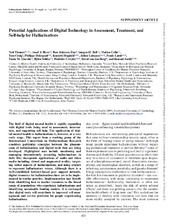| dc.contributor.author | Thomas, Neil | |
| dc.contributor.author | Bless, Josef J | |
| dc.contributor.author | Alderson-Day, Ben | |
| dc.contributor.author | Bell, Imogen H. | |
| dc.contributor.author | Cella, Matteo | |
| dc.contributor.author | Craig, Tom | |
| dc.contributor.author | Delespaul, Philippe | |
| dc.contributor.author | Hugdahl, Kenneth | |
| dc.contributor.author | Laloyaux, Julien Freddy | |
| dc.contributor.author | Larøi, Frank | |
| dc.contributor.author | Lincoln, Tania M. | |
| dc.contributor.author | Schlier, Björn | |
| dc.contributor.author | Urwyler, Prabitha | |
| dc.contributor.author | van den Berg, David | |
| dc.contributor.author | Jardri, Renaud | |
| dc.date.accessioned | 2020-08-07T10:57:37Z | |
| dc.date.available | 2020-08-07T10:57:37Z | |
| dc.date.issued | 2019 | |
| dc.Published | Thomas N, Bless JJ, Alderson-Day B, Bell, Cella M, Craig, Delespaul, Hugdahl K, Laloyaux JF, Larøi F, Lincoln TM, Schlier, Urwyler, van den Berg D, Jardri R. Potential applications of digital technology in assessment, treatment, and self-help for hallucinations. Schizophrenia Bulletin. 2019;45:S24-S31 | eng |
| dc.identifier.issn | 0586-7614 | |
| dc.identifier.issn | 1745-1701 | |
| dc.identifier.uri | https://hdl.handle.net/1956/23544 | |
| dc.description.abstract | The field of digital mental health is rapidly expanding with digital tools being used in assessment, intervention, and supporting self-help. The application of digital mental health to hallucinations is, however, at a very early stage. This report from a working group of the International Consortium on Hallucinations Research considers particular synergies between the phenomenon of hallucinations and digital tools that are being developed. Highlighted uses include monitoring and managing intermittently occurring hallucinations in daily life; therapeutic applications of audio and video media including virtual and augmented reality; targeting verbal aspects of hallucinations; and using avatars to represent hallucinatory voices. Although there is a well-established Internet-based peer support network, digital resources for hallucinations have yet to be implemented in routine practice. Implementation may benefit from identifying how to market resources to the broad range of populations who experience hallucinations and identifying sustainable funding models. It is envisaged that digital tools will contribute to improved self-management and service provision for people experiencing hallucinations. Keywords: digital mental health, mHealth, Internet, smartphones, hearing voices, schizophrenia | en_US |
| dc.language.iso | eng | eng |
| dc.publisher | Oxford University Press | eng |
| dc.rights | Attribution CC BY | eng |
| dc.rights.uri | http://creativecommons.org/licenses/by/4.0 | eng |
| dc.title | Potential applications of digital technology in assessment, treatment, and self-help for hallucinations | eng |
| dc.type | Peer reviewed | |
| dc.type | Journal article | |
| dc.date.updated | 2019-11-14T11:30:40Z | |
| dc.description.version | publishedVersion | |
| dc.rights.holder | Copyright 2019 The Author(s) | eng |
| dc.identifier.doi | https://doi.org/10.1093/schbul/sby103 | |
| dc.identifier.cristin | 1673884 | |
| dc.source.journal | Schizophrenia Bulletin | |
| dc.relation.project | EU: ERC 693124 | |
| dc.relation.project | Norges forskningsråd: 213363 | |

